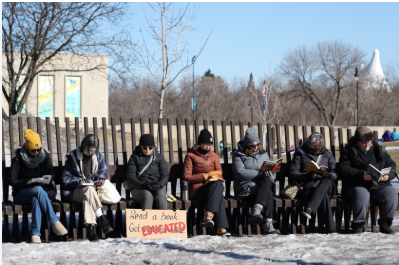The Union and School Board’s continued struggle
The Fargo Public school board met with The Fargo Education Association, FEA, on Jan. 8 to try to create contracts for the 2019-2020 school year with the help of mediation. This was just another event within the long disagreements between the board and FEA. It was fueled Aug. 26 when the board declared an impasse, despite the FEA still wanting to negotiate. The FEA feared that the school board would then enforce a contract upon them, as they had done in years past. In order to prevent this, the FEA decided to take the school board to court. This was announced by then-president David Marquardt in an email to union members. However, the judge said he couldn’t force the board to negotiate, although he didn’t think that they were at impasse. The Board and FEA moved to mediation. Each group chose a person who together chose a third person. Those 3 suggested a compromise between the board and the union. They said that the school board could find the money to increase salaries at a compromised amount if they reprioritized school spending.
The commission met with the FEA and school board during an open public meeting on January 8 at 4:00pm at Fargo South High School. FEA president Jennifer Mastrud gave a prepared opening statement that argued the FEA’s case. She began by saying, “Even though teachers didn’t come for the money, that doesn’t mean they shouldn’t be compensated.” Mastrud returned to this subject later on by saying, “Teachers don’t expect to be penalized for their career choice.” Mastrud then began to stress the importance of teachers by saying, “No one person has a greater impact on the education of the child than the teacher… Teachers are vital for the health of community… It is crucial that public schools recruit and maintain high quality teachers.” Mastrud then brought to the attention of the board that Fargo Public Schools is in a teacher shortage. She said, “The demand for teachers is escalating, while the supply of teachers is declining.” Mastrud argued that higher pay will attract teachers. She went on to say that the teachers of Fargo Public Schools are highly skilled, 60% have masters degrees, and deserve to be paid a reasonable amount.
Mastrud then proceeded to call out the school board for giving, “misguided, inconsistent, and untrustworthy information.” She cited 8 times in which this was evident. Some examples were when the school board said that state funding had been decreased, but there was actually a 2% increase in state aid. Also, the board lied about projected teacher increase. At this point, Mastrud handed over a document to prove this. There was also a time when the board shared a document with the FEA that didn’t match the official document, even after they requested a new one.
Mastrud finished by addressing the concerning fact that only 5% of Fargo Public School teachers felt supported by the school board. She asked the question, “Why?” Some reasons that Mastrud provided are that the board members are no longer required to visit the classrooms, and that the board often responds to the FEA with a, “No.” Furthermore, FEA had found 8 misleading statements, as she had mentioned before, and the board is willing to change policies, but not the contract.
Mastrud ended her opening statement by saying that there is a divide between the board and the teachers, but they need to remember that they are on the same side: the students.
The negotiation leader for the school board, John Rodenbiker, then gave his opening statement. He said, “The board has made every attempt to negotiate in good faith.” He said that they had come to an agreement on everything except salary and benefits. He then said, “The board has tried to put every dollar available into the salary.” Rodenbiker explained that the board had already approved a deficit budget for the year and that this was not sustainable. He emphasized that the board needs to keep the sustainability of the future in mind when creating the contracts. Rodenbiker ended by saying, “The board is optimistic that a two year contract can be found.”
The FEA and school board then both gave justification statements in which they further supported their claims.
After this, they moved to the fact finding commission who would try to help them come together with a contract. They moved at quite a slow pace in which the mediation questioned many topics ranging from why a proposal concerning the length of the school year was brought back after seemingly being tabled, to the financial state of Fargo Public Schools, in which the mediation expressed concern over the unsustainability within the current path.
A fact finding commission member Dean Rummel ended the meeting with some reminders and words of advice. He told them that the fact finding commission would come out with a report within seven to ten days because they only had two issues to resolve. Rummel warned, “If negotiations aren’t complete in the 20 day limit [after the release of the report], it is required that we publish it in the Fargo Forum. I would really like to not do that this time. I would really like for you to come to an agreement.” Rummel also prepared both sides for disappointment by saying, “It is usually the case with the fact finding committee that we make neither side happy.”
After Rummel’s ending statement, the long meeting came to an end and the union and board awaited the commission’s report. This report was sent on Jan. 15 to the union and school board, but it was not open to the public.
However, the report was shared by an anonymous source on Jan. 16. The report gave four recommendations. It said, “We recommend a two-year contract covering the academic year
2019-2020 and 2020-2021. We recommend that all items previously agreed to, remain in the
agreement. We recommend an increase in base in year one of 1.5% and a 1.1% increase in year two. We recommend no changes to the work year.” The recommended increase in pay was very similar to the board’s final offer of a 1.1% increase in year one and a 1.5% increase in year two. It was lower than the union’s final offer of a 2.5% increase in year one and a 2.0% increase in year two.
The final negotiations meeting was Wednesday, January 22, at 4 p.m. at the district office. The result of this meeting will be published online, as it is after this issue’s publication.
Your donation will support the student journalists of Fargo North High School. Your contribution will allow us to resume physical printing of our newspaper for students at Fargo North!

Laura Simmons is a writer for Fargo North High's Scroll. She takes Orchestra and Latin as well as Journalism for her electives. She is also active in multiple...


